 This past weekend I went to Boston Startup Weekend, a 54 hour event designed to bring a mix of developers, designers, and business people together to pitch ideas, form teams, and build the core of a startup. From around 100 attendees, 70 Â ideas were pitched, around 20 teams were formed, and the weekend ended with around 17 teams presenting their work.
This past weekend I went to Boston Startup Weekend, a 54 hour event designed to bring a mix of developers, designers, and business people together to pitch ideas, form teams, and build the core of a startup. From around 100 attendees, 70 Â ideas were pitched, around 20 teams were formed, and the weekend ended with around 17 teams presenting their work.
I debated pitching a few ideas. A map tool using the StartupsInBoston.com and event data, an infographics creation tool, and various tools using twitter data. Ultimately, I pitched a twitter browser extension that would display a second stream of tweets related to your interests, unlimited by whether you were following the tweeters or not. It was the business model that most interested me in this, but I didn’t include it in the pitch (whoops).
Finding a Team to Join
With my idea out of the running, I was one of the many attendees figuring out not just what I wanted to work on, but who I wanted to work with. There was a great crowd at Startup Weekend, and I met some awesome people during the pre-pitch networking:Â Dan Vidal ( co-founder of ArtVenue), Lily Wang (designer at Incrwd), and Sergio Ferreira (owner of Ferreira Concrete Forms), among others.
Sergio was a construction subcontractor business owner who’d been thinking about a problem his business (and the many subcontractor businesses like his) had: the inefficient, hard-to-track process of sending project bids to General Contractors.
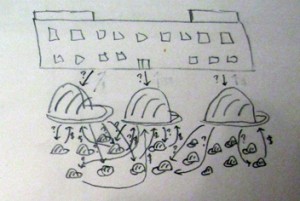 Subcontractors like Sergio might be asked for bids on pieces of 20 building projects each week, sending their bids to 5 to 15 GCs bidding on the whole project. GCs have software to manage their process of sending out bid requests, adding up different estimates, etc., but subcontractors didn’t have good tools of their own.
Subcontractors like Sergio might be asked for bids on pieces of 20 building projects each week, sending their bids to 5 to 15 GCs bidding on the whole project. GCs have software to manage their process of sending out bid requests, adding up different estimates, etc., but subcontractors didn’t have good tools of their own.
A clear problem, with a solution being proposed by a guy who has deep domain experience and many industry connections? Count me in. Two developers who also had some knowledge of the industry were also interested, and although Pete was getting hit hard by a cold that was going to keep him from participating for the rest of the weekend, Jason was good to go. With our team formed, the little time remaining on Friday evening was spent defining the product scope.
A Quick Startup Setup
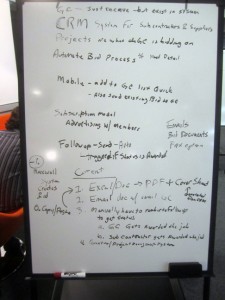 With any hackfest-like event, it’s more important than ever to focus on building the minimum viable product. There were plenty of pieces that could go into a useful subcontractor bidding management tool, that came out of our initial brainstorming session: document creation, email automation, CRM functionality, tracking, reporting, etc. What was the key piece of functionality that showed the power of this product? We decided it was bid tracking.
With any hackfest-like event, it’s more important than ever to focus on building the minimum viable product. There were plenty of pieces that could go into a useful subcontractor bidding management tool, that came out of our initial brainstorming session: document creation, email automation, CRM functionality, tracking, reporting, etc. What was the key piece of functionality that showed the power of this product? We decided it was bid tracking.
The rest of Friday evening was spent organizing ourselves. Where would we host code? (Azure for the app, my hosting for initial development of the sales site on WordPress.) How would we share files and track to-dos? (A combination of Trello, which I’d been itching to try with a team, email, and Google Docs.) What would we name this thing? (I pointed Sergio to LeanDomainSearch and a number of good potential names I’d found through it, and in the morning he came back with SubBids.)
Stop Planning, Start Working
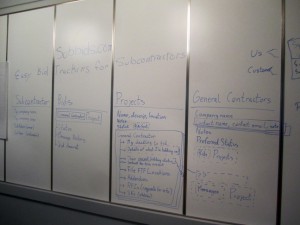 Saturday morning, development began in earnest. Drawing on Sergio’s knowledge, I created an overview of the information we wanted the system to capture, giving Jason a starting point to create the actual data model from. With that and some sketched mockups of the app I had done, Jason started development while Sergio worked on fleshing out the business research and customer validation, and I got started on the customer-facing site that people would first see when they came to SubBids.com.
Saturday morning, development began in earnest. Drawing on Sergio’s knowledge, I created an overview of the information we wanted the system to capture, giving Jason a starting point to create the actual data model from. With that and some sketched mockups of the app I had done, Jason started development while Sergio worked on fleshing out the business research and customer validation, and I got started on the customer-facing site that people would first see when they came to SubBids.com.
Building SubBids with only three people was hard. On the other hand, it meant we didn’t need to spend a lot of time coordinating efforts. Much of Saturday we all spent with headphones in, heads down, executing on our pieces of the project. At the end of the evening, we reviewed the sizeable progress we’d made and headed home after I white-boarded our to-dos for the next day:
- Integrating Jason and I’s work
- Getting me access to a shared dev environment so I could style the app
- Jason finishing the core app functionality
- Sergio finishing the presentation for Startup Weekend’s judges
- Group shakedown use of the app
- Bug fixes sprint while Sergio practiced presentation
- Enhancement sprint (if we had time)
The Rush to Finish
Sunday, things started to feel rockier quick. We were moving forward, discovering things that need to be added, changed, or fixed and implementing them as we went. But nothing causes things to go wrong better than a deadline. Getting a shared development environment setup took longer than expected. Sergio was getting tough pitch feedback. Key functionality was still incomplete.
Prioritization time. There’s no way we can get a fully-functional, bug-free, polished app done in the hours left. What do we need to prove the concept? What do we have to get done? Jason and I start sharing a couch, with me looking up Razor syntax and modifying views as he rejiggers objects and builds the bid status logic. Sergio’s reworking the presentation and planning the demo as we tell him what will and won’t be available.
Startup Weekend Judgement Day
Finally, we’re out of time to do more. As much as I’d love to keep iterating small improvements up to the second of our presentation’s start, our last set of deployments has somehow broken Azure’s ability to allow remote access. Probably for the best; last-minute changes are a great way to break everything.
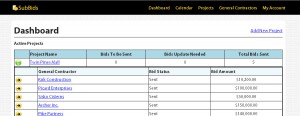 After 16 other pitches, Sergio steps up and gives a solid presentation of the problem, our solution, and the business opportunity. We walk our way through a not-rehearsed-enough demo. Look at that front page — so clean, such a clear value prop! How it works page, go! Application screen 1; look at that sexy dashboard. jQuery toggle, bam! Josh Bob gets the Back to the Future reference, excellent. No one spots the Star Trek references, lame.
After 16 other pitches, Sergio steps up and gives a solid presentation of the problem, our solution, and the business opportunity. We walk our way through a not-rehearsed-enough demo. Look at that front page — so clean, such a clear value prop! How it works page, go! Application screen 1; look at that sexy dashboard. jQuery toggle, bam! Josh Bob gets the Back to the Future reference, excellent. No one spots the Star Trek references, lame.
We show some other pages — this is how you do stuff. I show the dashboard again — now you know more about how cool this is. Crap, we haven’t run out of time yet. Please don’t make me show pages that don’t work yet. Oh thank god we’re done.
Wrapping Up
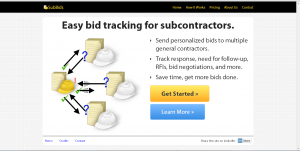 SubBids took 1st place. It’s unfortunate there wasn’t an explanation of the choices / final words from the judges, but I have to imagine they saw what I did: clear problem, good start on a solution, team that can make it work, feasible business. Â Being the smallest team to present, Jason, Sergio, and I were all thrilled to win.
SubBids took 1st place. It’s unfortunate there wasn’t an explanation of the choices / final words from the judges, but I have to imagine they saw what I did: clear problem, good start on a solution, team that can make it work, feasible business. Â Being the smallest team to present, Jason, Sergio, and I were all thrilled to win.
The victory aside, Startup Weekend was a great experience because of just that: experience. Every opportunity to use your skills helps you grow them. Â Add an opportunity to see a dozen and a half other startups being born on top, and a lasting network of your fellow participants, and you’ve got an event worth going to.
Jason has his own recounting of the weekend coming from a developer’s perspective: My Experience as a Developer at Startup Weekend (Friday).